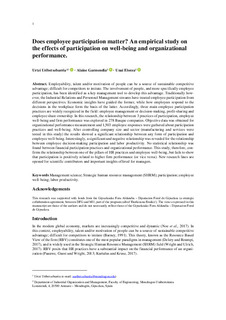Izenburua
Does employee participation matter? An empirical study on the effects of participation on well-being and organizational performanceBertsioa
Postprinta
Eskubideak
© Springer-Verlag GmbH Germany, part of Springer Nature 2020Sarbidea
Sarbide bahituaArgitaratzailearen bertsioa
https://doi.org/10.1007/s10100-020-00704-7Non argitaratua
Central European Journal of Operations Research Early Access, agosto 2020Argitaratzailea
Springer-Verlag GmbHGako-hitzak
Management science
Strategic human resource management (SHRM)
Participation
Employee well-being ... [+]
Strategic human resource management (SHRM)
Participation
Employee well-being ... [+]
Management science
Strategic human resource management (SHRM)
Participation
Employee well-being
Labor productivity [-]
Strategic human resource management (SHRM)
Participation
Employee well-being
Labor productivity [-]
Laburpena
Employability, talent and/or motivation of people can be a source of sustainable competitive advantage; difficult for competitors to imitate. The involvement of people, and more specifically employee ... [+]
Employability, talent and/or motivation of people can be a source of sustainable competitive advantage; difficult for competitors to imitate. The involvement of people, and more specifically employee participation, has been identified as a key management tool to develop this advantage. Traditionally however, the industrial relations and personnel management streams have treated employee participation from different perspectives.
Economic insights have guided the former, while how employees respond to the decisions in the workplace form the basis of the latter. Accordingly, three main employee participation practices are widely recognized in the field: employee management or decision-making, profit-sharing and employee share ownership. In this research, the relationship between 3 practices of participation, employee well-being and firm performance was explored in 278 Basque companies. Objective data was obtained for organizational performance measurement and 1503 employee responses were gathered about participation practices and well-being. After controlling company size and sector (manufacturing and services were tested in this study) the results showed a significant relationship between any form of participation and employee well-being.
Interestingly, a significant and negative relationship was revealed for the relationship between employee decision-making participation and labor productivity. No statistical relationshipwas found between financial participation practices and organizational performance. This study, therefore, confirms the relationship between one of the pillars of HR practices and employee well-being, but fails to show that participation is positively related to higher firm performance (or vice versa). New research lines are opened for scientific contributors and important insights offered for managers. [-]






















